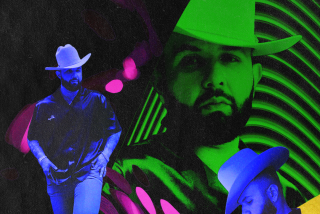Mysterians Revive Their ‘Tears’ Genre
- Share via
The instant it burst onto the radio in 1966, ? & the Mysterians’ “96 Tears” was a rock ‘n’ roll classic, a slice of primal urgency with a dark edge built on a pulsing, insistent Vox organ figure drawn from Mexican polkas, all shrouded in a purposefully sketchy image keyed to the band’s name. Singer Rudy Martinez even legally changed his name to the punctuation symbol.
But who at the time--or since--would have guessed that the Mexican-rooted, Michigan-based one-hit wonder’s vintage lineup would be putting on dynamic shows more than three decades later? On Monday at the Dragonfly, the group, reunited last year after breaking up in 1968, showed such spirit that it seemed bent not just on bringing itself back but also on reviving its whole realm of music.
Along with Texas’ 13th Floor Elevators, L.A.’s the Seeds, Chicago’s Shadows of Knight, San Jose’s Count Five and dozens of others around the country, the Mysterians forged a rough-hewn alloy of James Brown shouts, bubble-gum pop hooks and nascent psychedelia--not the peace ‘n’ love kind but anger ‘n’ confusion. Though acknowledged as a punk progenitor, the genre has largely been obscured through wave after wave of ‘60s nostalgia by Beatlemania and flower power.
It was never a complex formula, but it was--and remains--compelling in its unique way. The whole show Monday was essentially variations on “96 Tears”: two- and three-chord workouts, organist Frank Rodriguez’s pumping Tex-Mex evocations and ?’s desperate pleas. But it was plenty to get the room of ‘60s rock connoisseurs and Hollywood club regulars into a dancing frenzy.
And not to be dismissed is ?’s own colorful presence. Skittering soul revue-style around the stage in an orange flamenco shirt and black leather pants, he at times brought to mind another pop showman who changed his name to a symbol: He seemed nothing if not the proto-Prince.
Is this comeback going to storm the late-’90s pop charts? Not likely. But does it prove this music worthy of more than pop encyclopedia footnotes? No question.
More to Read
The biggest entertainment stories
Get our big stories about Hollywood, film, television, music, arts, culture and more right in your inbox as soon as they publish.
You may occasionally receive promotional content from the Los Angeles Times.









